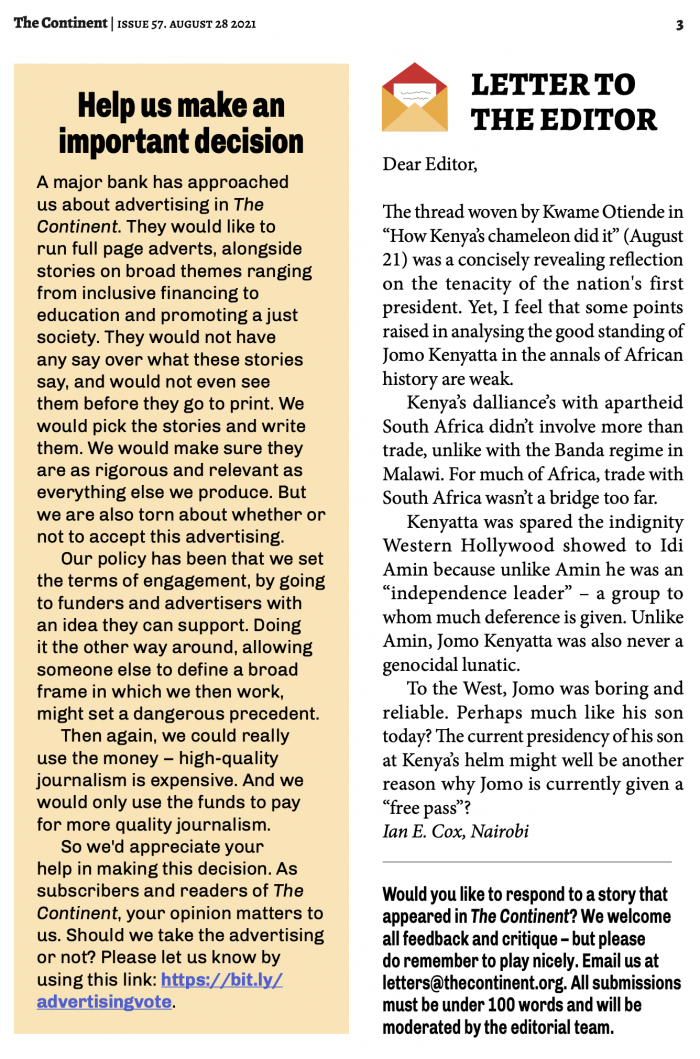In the August 28 edition of The Continent, a weekly digital newspaper that covers news across the African continent, the editors asked the readers: Should The Continent accept an advertising deal from a bank?
Nieman Lab readers may remember reading about The Continent here recently. It’s a digital publication that launched in April 2020. Each issue is published on WhatsApp and Signal. The publication is currently funded and published in collaboration with the South African weekly Mail & Guardian, and accepts donations from readers. It’s never had advertising before, let alone sponsored-ish content.On page 3 of the August 28 issue, the editors explained that accepting the offer would mean that regular ads for the bank would run in the paper, but alongside stories of “themes ranging from inclusive financing to education and promoting a just society.”
“Our policy has been that we set the terms of engagement, by going to funders and advertisers with an idea they can support,” the editors wrote. “Doing it the other way around, allowing someone else to define a broad frame in which we then work, might set a dangerous precedent. Then again, we could really use the money — high-quality journalism is expensive. And we would only use the funds to pay for more quality journalism.”
The Continent then gave readers a clickable link to a Google Form survey where they could vote yes or no and then offer their opinion on the issue.

Within a week, the survey had 445 responses, with 82% of respondents saying they were in favor of the deal, as long as The Continent maintained its editorial independence.
“It was a test case to see whether our readers would engage on substantive issues about the direction of the newspaper,” editor-in-chief Simon Allison said. “We were blown away by the responses, [many] of which were really detailed. We had people writing essays, going into weighing the various ethical implications and the financial side of things, and how they thought it might affect our journalism and what we should be weary wary of. That input really helped clarify our own thoughts in the editorial team and helped us to reach the decision.”
Last week @thecontinent_ was offered an advertising deal by a major bank. We weren’t sure whether to accept it – so we asked our readers for their advice. Here’s what they said, with big thanks to everyone who participated. pic.twitter.com/gCaJGvXEhy
— Simon Allison (@simonallison) September 7, 2021
Based on reader feedback, The Continent decided to accept the advertising deal.
“Readers are smart. The readers of our publication can be trusted to weigh in thoughtfully and meaningfully on complex issues,” Allison said. “Why not take advantage of the combined intellect and have a really smart group of people who are invested in your publication? It seems like a resource that we really should be taking advantage of.”
Love this. I voted yes. Good Journalism costs money. And to survive, it will have to accept money from different sources – readers, advertisers, philanthropists. https://t.co/BdN3C9ze9D
— Oláyínká (@solomonelusoji) September 7, 2021
In recent years newsrooms have started to more frequently engage their audiences directly for stories and feedback on their journalism. But The Continent’s experiment to include readers in its business decisions is a new level of transparency that goes beyond just disclosing its revenue sources. Since The Continent is distributed mainly on WhatsApp, Signal, and Telegram, it relies on its readers for growth. It asks readers to share their work with their friends, family, and anyone else they think could benefit from the journalism.
“I think it’s a really important part of establishing editorial integrity, and establishing trust with readers,” Allison said. “The Continent is in a place where we have been funded by donors that cover our most of our core funding. Our readers know about this. We’re very clear about that. So bringing in advertising is a new thing and bringing in this particular form of advertising — an advertiser wanting us to do reporting on a specific issue — is a sort of gray area when it comes to how ethical that is, and so we thought it’s better to flag it before we do it.”
Allison said that in the meeting he had with his staff (three full-time and five part-time employees) about whether or not to pose the question to readers, the decision wasn’t unanimous. Some team members were concerned about the paper outsourcing its editorial judgment” while others were worried about what the next step would be if the readers came to a different conclusion than the staff.
Ultimately, Allison said, the benefits of asking outweighed the concerns. Doing so also served as a way of holding the paper’s ground with advertisers. Allison explained that in South Africa, and across the continent, more and more advertisers want to place native advertising or sponsored content that doesn’t look like advertising unless you’re reading very closely. Advertisers feel that it gives their brand more legitimacy, but sometimes journalists worry that accepting these kinda of deals lowers its journalistic integrity and can erode trust with the readers.
“Part of what we were doing with this is also trying to educate the advertisers and show them these are serious ethical issues that [they] are bringing into our newsroom,” Allison said. “If we decide that [they’re] pushing us too far, we will say no, and we’re lucky we’re in a position to do so.”
"accept" - Google News
October 12, 2021 at 08:34PM
https://ift.tt/3v3lz6Z
Here's why The Continent asked its readers if it should accept an advertising deal - Nieman Journalism Lab at Harvard
"accept" - Google News
https://ift.tt/2YsXkRf
https://ift.tt/3d2Wjnc
Bagikan Berita Ini















0 Response to "Here's why The Continent asked its readers if it should accept an advertising deal - Nieman Journalism Lab at Harvard"
Post a Comment